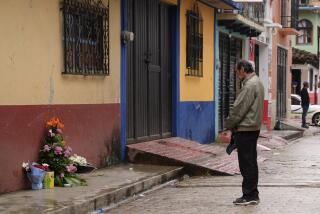Mexico Confirms Probe of Ex-President : Crime: Authorities investigate what Carlos Salinas de Gortari knew about official’s slaying.
- Share via
MEXICO CITY — As a key player in the case maintained his innocence Wednesday in a U.S. proceeding, authorities here confirmed for the first time that they are investigating former Mexican President Carlos Salinas de Gortari to determine what he knew--and when--about his older brother’s alleged role in last year’s murder of a top official of the ruling party.
“Of course this is being investigated,” Deputy Prosecutor Rafael Estrada told reporters Tuesday. An attorney general’s spokesman later characterized the statement as confirmation that Salinas is under investigation in the killing of Francisco Ruiz Massieu, formerly secretary general of the Institutional Revolutionary Party, or PRI.
But Atty. Gen. Antonio Lozano later used softer language when reporters asked whether his prosecutors plan to summon for questioning the former president, who now is staying in the United States.
“We are in a preliminary analysis of whether there are elements of a crime or not,” said Lozano, who has insisted that his investigators have found no evidence linking the former president to the Ruiz Massieu case.
Meanwhile, in Newark, N.J., Ruiz Massieu’s brother--in his first public testimony in the matter--said that his dead sibling had been “a very dear” family member for whom he had “a great fondness.”
Taking the witness stand to fight extradition, Mario Ruiz Massieu said he felt “morally devastated” by the assassination Sept. 28 of his brother and immediately asked to be put in charge of investigating the killing.
He strenuously denied charges that he had covered up the alleged role of Raul Salinas de Gortari, the former president’s older brother, in plotting the assassination. Some Mexican authorities suspect the two were partners in illicit drug deals.
On Wednesday, Ruiz Massieu attacked his accusers, claiming he was not even present when some of them contend he intimidated them.
U.S. Magistrate Ronald Hedges, who is presiding at the extradition proceedings, is expected to rule next week on Mexico’s request to have Ruiz Massieu returned to face charges related to the slaying.
The 44-year-old former official, who resigned in November as his country’s deputy attorney general, was seized by U.S. Customs agents three months ago when he sought to board a plane for Madrid at Newark International Airport. He was arrested on charges of failing to declare most of the $40,000 in currency he was carrying.
Subsequently, customs agents discovered at least $9.3 million in his name in Texas bank accounts, which Mexican investigators believe represent illicit drug payoffs.
Ruiz Massieu, who was Mexico’s crusading anti-drug prosecutor, is suspected of receiving kickbacks from his own handpicked federal police officials, who in turn took bribes from top drug traffickers to protect their cocaine trade, some officials have said.
But Ruiz Massieu was not asked about these allegations Wednesday because they do not relate to the charges on which his potential extradition would be based.
Before two hours of public testimony--his first in either the United States or Mexico--Ruiz Massieu was advised by Hedges that he could assert his constitutional right to remain silent. He said he wished to waive that right in order to respond to the Mexican charges.
With his wife, Maria, and 6-year-old daughter, Regina, sitting in the back of the court, Ruiz Massieu said that with the help of his late brother--who had risen in the inner Salinas circle--”I always felt that I could fight for justice and truth in Mexico.”
But he said he became outraged when some suspects arrested for his brother’s assassination began to implicate him.
Ruiz Massieu has been accused of intimidating witnesses and falsifying evidence to try to protect Raul Salinas de Gortari, who has been formally charged with ordering and financing the slaying.
The former president vehemently has denied any involvement in or knowledge of the conspiracy behind the murder.
It remained unclear Wednesday what role--if any--prosecutors suspect Carlos Salinas de Gortari may have played in the execution-style slaying of Francisco Ruiz Massieu.
Rather, independent Mexico City analysts such as Sergio Sarmiento said the impact of Deputy Prosecutor Estrada’s confirmation symbolized what he called “a climate of lynching” for the former president.
Jackson reported from Newark and Fineman from Mexico City.
More to Read
Sign up for Essential California
The most important California stories and recommendations in your inbox every morning.
You may occasionally receive promotional content from the Los Angeles Times.













